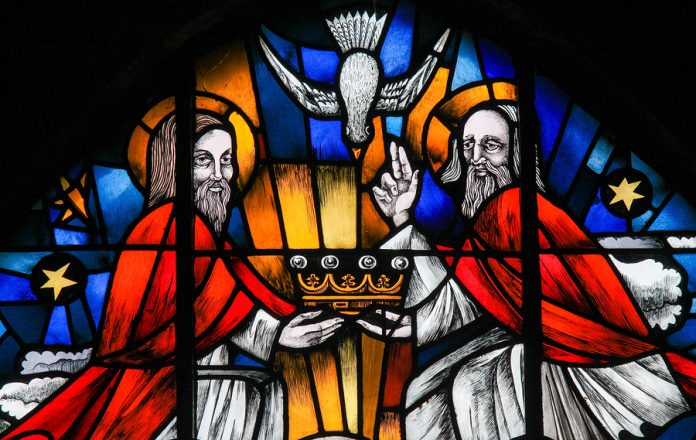Reflection for the Solemnity of the Most Holy Trinity (Cycle C)
The polyphony of life determines the polyphony of our humanity, which sensibly explains the polyphony of our God. Life is a potpourri of cycles, tensions and processes occurring together in a seemingly confusing yet harmonious simultaneity that compels us to assume a multiplicity of roles and responsibilities, at times contradicting yet essentially synergistic.
It is therefore not hard to see that God – in whose image we have been created – can be the same way. He is not and never will be a predictable and single-faceted deity, but a Spirit of divine complexity, a God who is and will ever be “one yet many.”
In the raising of a child for example, a parent when committed to the service of the unpredictability of its offspring, must guide and direct it from a variety of stances and positions – ranging from “authoritative” to “participative” – depending on present needs and circumstances.
A parent can understandably be “strict” or “not strict” at certain times or conditions because the child is still grappling with the critical differences between enjoying “pure freedom” and exercising “freedom with responsibility.”
Moreover, many parents regardless of gender, have functioned as both “superior wage-earners” and “subservient home-helpers” – as both “heads of families” and “servants of families” – to adapt to children either requiring “only minimum supervision” or “extreme care.”
Hence, no parent has ever decided to remain inflexible, and are constantly in a state of flux, naturally opting to engage differing situations with a “toolbox of styles, traits and techniques.” Not that it wanted to be complex for its sake, but because it is the only logical approach to catering to the myriad of aspirations, expectations and manifestations of an unavoidable diversity.
Yet, while the parent may be compelled to wearing different hats, or taking on different “natures,” it is in substance, still the same parent. This situational approach of “becoming different persons for different people or a differing dependent” may often leave us with the first impression that our parents are beyond discernment; but it is only because we are always accustomed to imagining a singular and absolute nature for each individual human being which cannot be shifted to its opposite i.e., a “strict” person cannot be inconsistently “less strict;” a “dominant” person will not permit its own subordination; a “good” person cannot possibly become “evil”, nor can an “evil” person ever become “good”, etc.
It is the same with God. Our Divine Parent is truly “once and for all,” but must be “one yet many.” He is the paradox of a transubstantiating constant. It is futile to attempt arriving at its rationalizations because we are humanly limited to resolve it; we must learn to be content with the perpetuity and inscrutability of the Mystery. In our zeal to defend his apparent immutability, it became more challenging to accept his enigmatic changeability.
The complexities of life thus cause the complexities of human responses to it; similarly, the complexities of the collective response of our humanity to the inevitability of the human condition – as children of creation – requires the belief in the complexities underlying a loving and caring Parent-Creator. The Mystery is unraveling for us through the experience of parenthood, the mystery of his undefinable nature.
If like humans, the ancients can only describe their gods in “singular and absolute” terms, then the only way they can describe a God who is at once our Creator, Redeemer and Sanctifier, is through a mediated concept of “three-gods-in-one-God.” But the truth still remains that the Lord is only one, transcendent beyond yet immanent within our world and our history, becoming the appropriate “God” at the right place and at the right time.
But why must he allow himself to be so inexplicable? Like parents, the only explanation to divine complexity is love: Only love can inspire total responsibility, to “become different persons for different people or differing dependents.” Only love can inspire servant leadership, to “become the head who washes the foot of the body.”
The risk of being forever deemed as “beyond apprehension” is largely outweighed by the risk of choosing not to love. Our Abba took this same risk when he allowed our Trinitarian understanding of his nature to be forever contested as “irrational,” because it is far outweighed by the risk of choosing divine indifference, and not giving us the space to think and act freely. Indeed, true love always has a price, but a price worth dying for.
Brother Jess Matias is a professed brother of the Secular Franciscan Order. He serves as minister of the St. Pio of Pietrelcina Fraternity at St. Francis of Assisi Parish in Mandaluyong City, coordinator of the Padre Pio Prayer Groups of the Capuchins in the Philippines and prison counselor and catechist for the Bureau of Jail Management and Penology.









